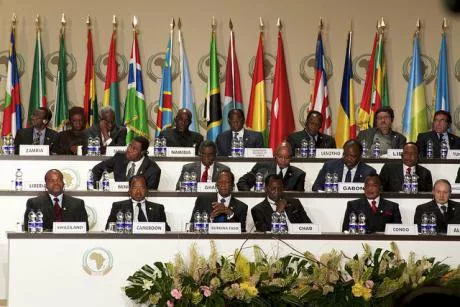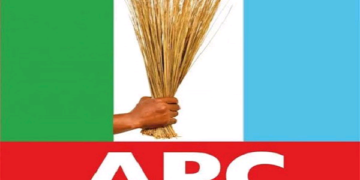Forty three years ago when Nigeria held elections to usher in the second republic and the African continent was still gripped by the military coup culture, a thirty seven year old lieutenant in Equatorial Guinea decided to continue in this culture. The soldier overthrew his uncle in a bloody coup d’état. The Uncle Francisco Macías Nguema, was the first President of Equatorial Guinea after the country attained independence from Spain. That soldier is Teodoro Obiang Nguema, current president of Equatorial Guinea, ruling since 1979.
Typical with many African leaders after independence, the deposed president is widely remembered as one of the most brutal dictators in history. After his overthrow, his nephew Teodoro placed him on trial for his actions. He was sentenced to death and executed by firing squad. Teodoro Obiang declared that the new government would make a fresh start from his uncle’s brutal and repressive régime. He granted amnesty to political prisoners, and ended the previous régime’s system of forced labor. However, he made virtually no mention of his own role in the atrocities committed under his uncle’s rule.
While his uncle was president, he achieved the rank of lieutenant, holding various positions, including the governor of Bioko and leader of the National Guard. He was also head of Black Beach Prison, notorious for severely torturing its inmates. By 1982, the country transited to civil rule albeit nominally and Teodoro Obiang was elected to a seven year term as president. He was the only candidate in the election. This was the same scenario in 1989 when he was supposedly reelected as the only candidate. By 1996 however with pressure from the international community, others parties were formed. But this didn’t prevent his victory in the polls of 1996 and 2002, with 98% of the votes.
Fast forward to the elections this month, it surely didn’t come as a surprise for many when it was announced that he had won the elections. His victory means that this will be his sixth term in office, thus becoming the world’s longest-serving president for over four decades. Irksomely, the announcement was made by his son and Vice President Teodoro Nguema Obiang Mangue. His son also stated that the 80-year-old won the re-election with 95 per cent of the votes. It is also highly likely that his son Mangue will succeed his father since Equatorial Guniea seems to have become their fiefdom.
Across Africa, remnants of the old order of “legal dictatorships” can still be found. In Uganda, Yoweri Museveni has been ruling the country since January 1986. None of the Ugandan elections of the last 30 years (since 1986) have been found to be free and transparent. In 2021, Museveni was re-elected for a sixth term despite reports that show ballot box stuffing, over 400 polling stations with 100% voter turnout, and human rights violations. As at this year and after 36 years of his authoritarian rule, Uganda is ranked 193rd in GDP (nominal) per capita and 167th by Human Development Index.
Paul Biya, president of Cameroon is another of the old order still in power today. Becoming president in 1982, he is currently the second-longest-ruling president in Africa and the oldest head of state in the world. Towards ensuring his stay in power, he instituted a one-party system in the 1980s but later acquiesced to multi-party politics in the 1990s; though he employed voting irregularities and election manipulations and fraud to consolidate power. Under the constitution, he has sweeping executive and legislative powers, considerable authority over the judiciary and his political party continues to dominate the National Assembly, which does little more than approve his policies.
It must be said in recent times though; the continent has witnessed a decline in sit tight dictators and political dynasties. Across Africa, long-standing dictators are losing their grip on power. For instance, Sudan’s Omar Al-Bashir and Algeria’s Abdelaziz Bouteflika were forced to step down. More recently, about twenty-six African countries have had transfers of power — a level of political turnover unseen since the 1990s. More than half the time, an opposition candidate defeated an incumbent in an election and took power. Yet the end of one dictator does not necessarily prevent the rise of a new one. In many African nations today, democracy rests on shaky foundations. Respect for civil and political liberties has been declining for years. Authoritarians continue rigging elections, repressing political opponents and staging coups.
Surrounded by countries inundated with crisis-laden democratic transition programmes, Nigerians in less than 100 days will be going to the polls, demonstrating that she remains one of Africa’s beacons of democracy. The presidential election next year will be the seventh in a roll since 1999. Recall that in 2015, Nigeria transited peacefully to an opposing candidate that won the presidential election. It’s been seven years and a re-election in 2019, President Muhammadu Buhari has assured the world that he will bequeath free, fair and credible elections to the country during his last speech at the 77thsession United Nations General Assembly.
As President Teodoro Obiang Nguema is “crowned” for a ridiculous umpteen time, he is widely regarded as a dictator and authoritarian leader. He has been accused of corruption and abuse of power. Under his rule, Equatorial Guinea continues to have one of the worst human rights records in the world, currently a dominant-party state, in which the political party he founded the Democratic Party of Equatorial Guinea (PDGE) holds virtually all governing power in the nation and has held all or almost all seats in the legislature since its creation. The country’s constitution provides him sweeping powers, including the right to rule by decree, effectively making his government a legal dictatorship.
Over the years, he has also placed family members in key government positions. In 2016, he appointed a new government after announcing the appointment of his son as Vice President. The 36-member government included two of his sons and his brother among other close relatives. Gabriel Obiang Lima Mbega, his other son retained the strategic Ministry of Mines and Hydrocarbons. Antonio Mba Nguema, his brother took over one of the two newly created offices, Department of Presidential Security while new entrant Reginaldo Asue Mango headed the Department of Planning.
The few past attempts by former presidents in Nigeria to overcome or abrogate term limits, or make them otherwise ineffective, has not been successful and they have shown the significance of constitutional engineering and its importance in upholding the rule of law, aiding Nigeria on building and sustaining effective democratic institutions, providing people with an effective legal tool to constrain, guarding the government and minimising impunity. The sanctity of constitutional term limits and steadfastly adhering to it is vitally important in Nigeria and in no part within our borders is there room for the kind of political dictatorship we witness in some other African countries.
In just under 100 days, Nigerians will exercise their right to decide the future of their nation but going to the polls to choose a new president. With hope that the electoral process will provide Nigerians with a free, fair, competitive, transparent, inclusive and credible exercise, may the power that Nigeria first exercised forty three years ago when it ushered in the second republic to overcome political dictatorship continue to be our reality. That way every four years of the electoral cycle, power can be consolidated by the Nigerian people who have the constitutional right to change their government and bring into public service new and more effective political leaders.











